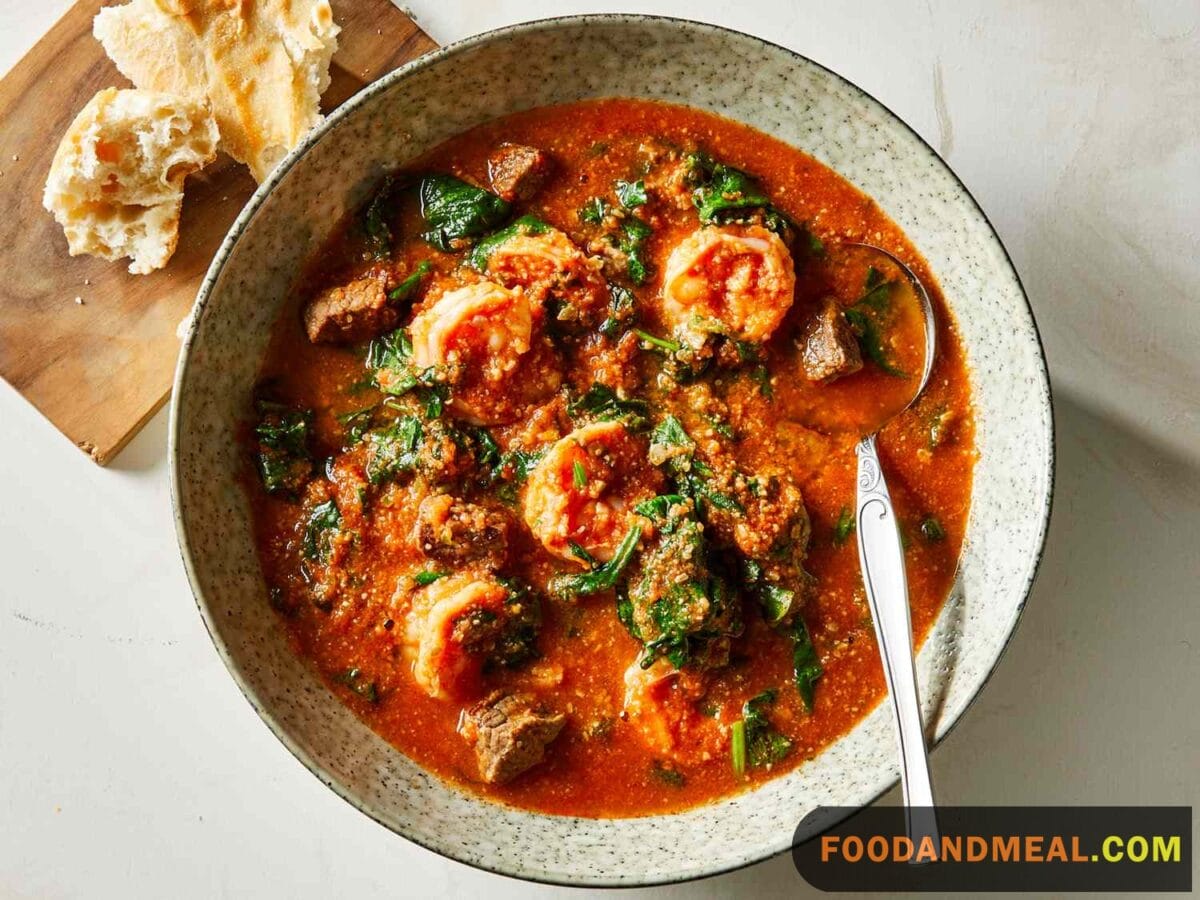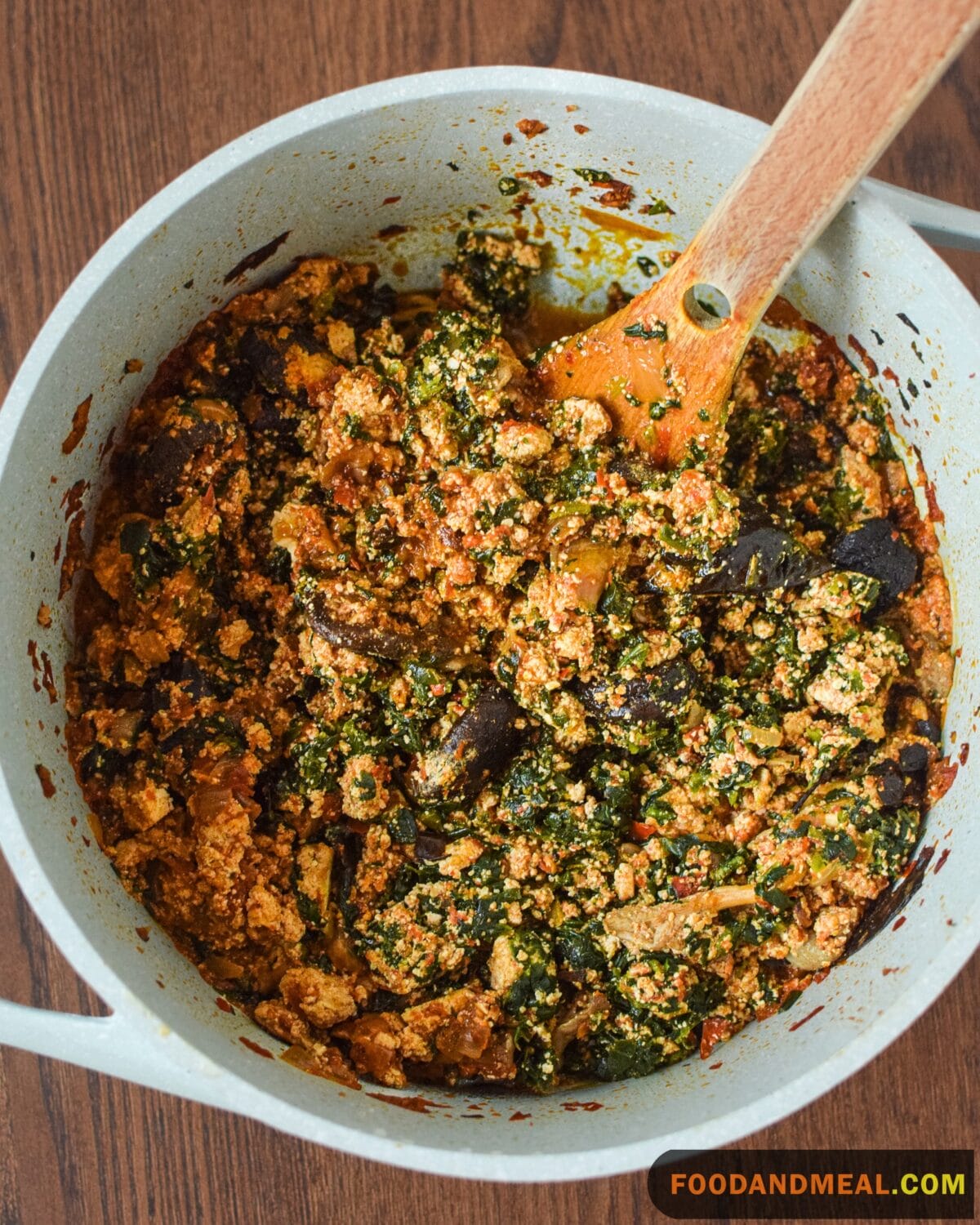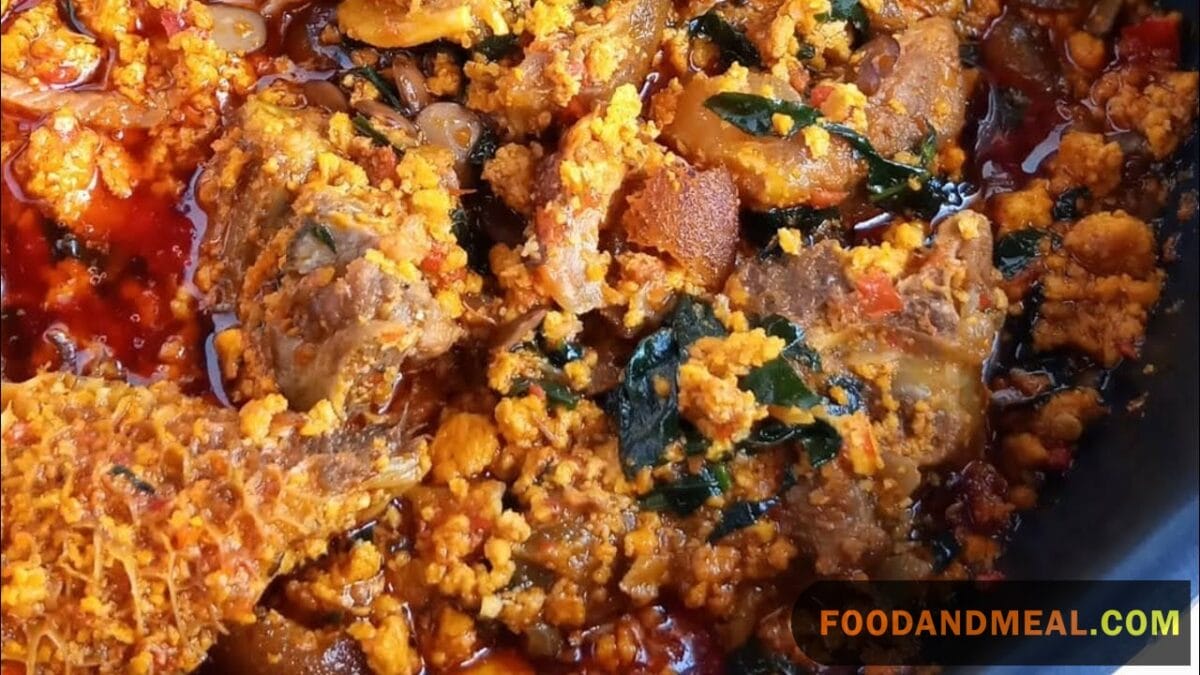As I stand in the kitchen, surrounded by the tantalizing aroma of spices and simmering pots, memories of home flood my mind. Growing up, Egusi Soup was a staple in my family’s kitchen—a comforting and hearty dish that brought us together around the dinner table. Now, far from the familiar sights and sounds of home, I find myself yearning for the warmth and nostalgia of those shared meals. That’s why today, I’m excited to share with you my own recipe for Egusi Soup. Through this blog post, I hope to not only recreate the flavors of my childhood but also introduce you to the rich culinary heritage of West Africa. Join me on this culinary journey as we explore the ingredients, techniques, and stories behind this beloved dish. Together, let’s rediscover the joy of cooking and savor the delicious flavors of Egusi Soup.
Egusi Soup Recipe


West African Egusi Soup
Equipment
Ingredients
- 2 cups ground egusi
- Red palm oil
- 2 tablespoon tomato paste you can use 2 fresh tomatoes, chopped
- 1 medium onion
- chili pepper
- salt
- Black or cayenne pepper
Instructions
- Heat the oil in a pot over medium heat.
- Add the onions and sauté for 1 minute
- Add all the ingredients to the pot except the ground egusi. Stir thoroughly and let it boil for 3 minutes.
- Add the egusi to the pot and stir. Add water to your desired consistency to make a smooth sauce.
- Cook on a low heat for 15 – 20 minutes.
- Serve with yam, rice, plantain, or grilled fish, chicken, or meat.
Video
Notes
Nutrition
© Food And Meal
This website provides approximate nutrition information for convenience and as a courtesy only. Nutrition data is gathered primarily from the Spoonacular Database, whenever available, or otherwise other online calculators.
Alternative Preparation Method: Slow Cooker Egusi Soup

In the heart of my kitchen, where the aroma of spices dances in the air, I embark on a culinary journey that resonates with the warmth and flavors of home. Today, I find solace in the art of preparing Egusi Soup, a cherished dish that embodies the essence of West African cuisine. As I marinate the meat with onions, ground crayfish, and fragrant spices, I am transported back to fond memories of family gatherings and shared meals. With each step, from preheating the slow cooker to blending the fiery Scotch bonnet peppers, I infuse this dish with love and tradition. As the ingredients mingle and simmer, I am reminded of the rich culinary heritage that binds us together. With patience and anticipation, I await the moment when tender meat and velvety Egusi meld into a symphony of flavors. Finally, as I add the vibrant greens and adjust the seasoning to perfection, I am filled with a sense of satisfaction and anticipation. With every spoonful of this slow-cooked masterpiece, I invite you to join me in savoring the comforting embrace of Egusi Soup, a true celebration of culture and community.
Tips for making Egusi Soup

Cooking Tips for Perfect Egusi Soup
As someone who appreciates the rich flavors and cultural significance of this Nigerian delicacy, I believe there are a few key tips to ensure your Egusi Soup turns out perfect every time. First and foremost, sourcing fresh ingredients is essential. Whether it’s the meat, vegetables, or spices, using high-quality, fresh ingredients will elevate the flavor of your soup and honor the tradition behind it. Additionally, taking the time to properly marinate the meat allows the flavors to develop and penetrate deeply, resulting in tender, succulent bites. When it comes to blending the Egusi paste, don’t rush the process. Take your time to achieve a smooth, creamy consistency that will give your soup its signature texture. Finally, don’t be afraid to get creative with your seasonings and garnishes. Whether you prefer a touch of heat from Scotch bonnet peppers or the earthy aroma of ground crayfish, tailoring the soup to your taste preferences adds a personal touch that makes it truly special.
Serving Suggestions for Egusi Soup

Options like Masbate Bulalo, Coconut Date Bites, Japanese Mazesoba, Japanese Fruit Pie, and Chocolate Truffles offer a diverse range of tastes and textures to complement the richness of the soup. Masbate Bulalo’s succulent beef and hearty broth provide a robust contrast to the creamy Egusi Soup, while the sweetness of Coconut Date Bites adds a delightful touch. Japanese Mazesoba‘s bold flavors and toppings create an exciting fusion, while Japanese Fruit Pie offers a refreshing fruitiness. Finally, indulging in decadent Chocolate Truffles provides a satisfying conclusion to the meal, balancing the savory notes of the soup with sweetness.
Frequently Asked Questions (FAQs) about Egusi Soup

- Can I make vegetarian Egusi Soup? Yes, you can make a vegetarian version of Egusi Soup by omitting the meat and using vegetable broth or water. It’s still incredibly flavorful.
- What’s the best way to reheat leftover Egusi Soup? To reheat Egusi Soup, use a microwave or a stovetop. If it thickens after refrigeration, add a little water or broth to achieve your preferred consistency.
- Can I use whole melon seeds instead of ground Egusi? Ground Egusi is the traditional choice for this soup because it provides a smoother texture and blends better. You can use whole melon seeds, but the result will have a different consistency.
- What greens are suitable for Egusi Soup? While spinach is commonly used, other greens like ugu (fluted pumpkin leaves) or bitterleaf can be used to add a unique twist to your soup.
- Can I prepare a large batch of Egusi Soup and freeze it? Yes, Egusi Soup freezes well. Store it in airtight containers in the freezer. Thaw and reheat as needed, adding a little water or broth to adjust the consistency.
Conclusion
In conclusion, Egusi Soup is more than just a dish; it’s a celebration of tradition, culture, and the rich tapestry of Nigerian cuisine. Through the careful selection of ingredients, thoughtful preparation, and a dash of creativity, you can create a bowl of Egusi Soup that pays homage to its roots while delighting your taste buds. Whether enjoyed with fufu, pounded yam, or rice, this hearty and flavorful soup is a beloved staple in Nigerian households and beyond. So next time you’re craving a taste of West Africa, why not whip up a batch of Egusi Soup and savor the comforting flavors of home? With a little love and attention to detail, you’ll be amazed at the culinary journey that awaits. For more delicious recipes and culinary inspiration, be sure to visit Food And Meal at foodandmeal.com.
Hello! I’m Black Pie, your culinary guide at Food And Meal, Hana Hotel Travel Company Limited. I'm passionate about unveiling the rich and diverse flavors of African cuisine to the world. Each recipe we explore is a celebration of culture, tradition, and exquisite taste. Join me on this delightful culinary journey, where we'll discover and share the hidden gems of African cooking together!


